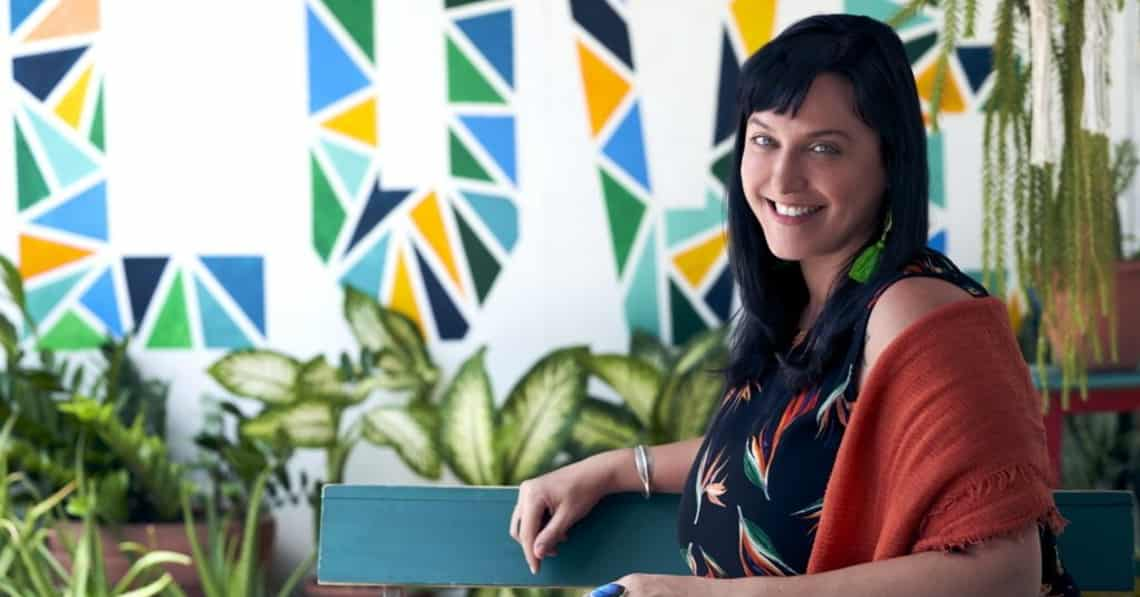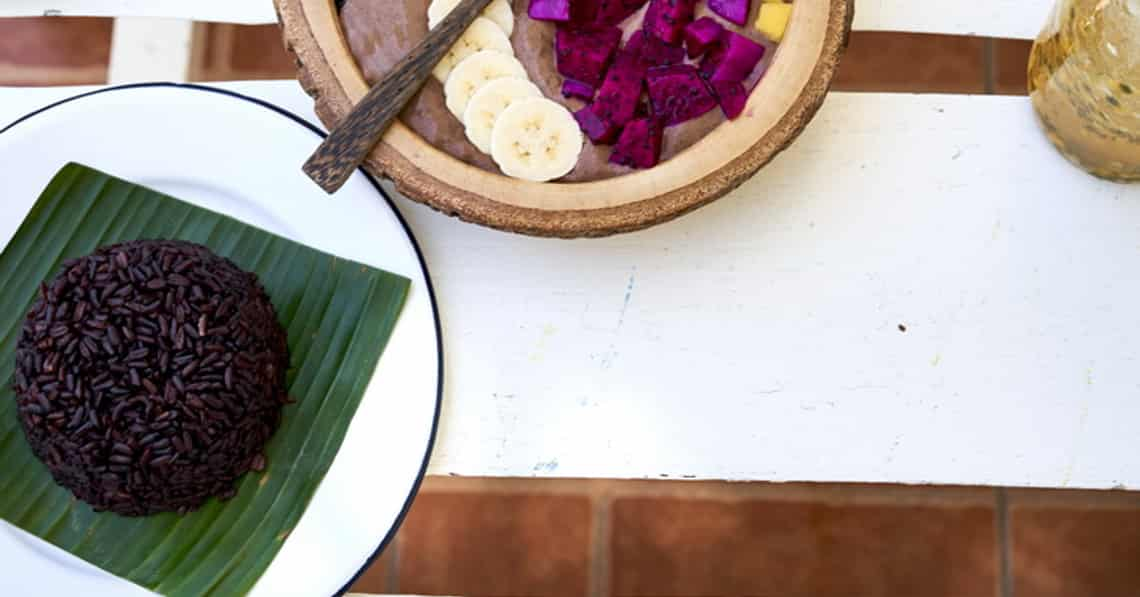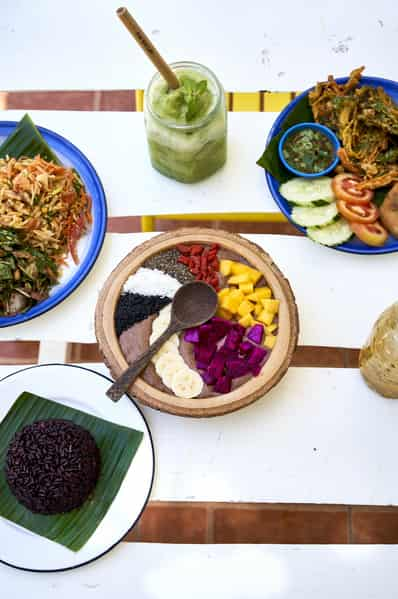A stack of menus featuring Shan vegan noodles and almond milk cappuccinos sits next to a row of second hand t-shirts artfully repurposed into reusable shopping bags beckoning to be taken home for only 40 baht a pop. A beaming girl stands at the counter hiding a smile as I fondle what I later learn is a yoni egg nestled next to some crystals and a row of organic, chemical free, package free cleaning products and toiletries. Chirpy signs abound announcing ‘Pre-loved’ goods, an upcoming digital nomad girls’ cocktail meetup, a ‘Zero Waste’ store and shelves of pretty colour-coordinated second hand books, a thrifter’s haven. Pieces of artwork crafted by any of the 60 children, teenagers and adults who come here nearly daily to learn, join a community and hope for a better life, dot the light and airy premises that is beloved by its mass of dedicated fans, customers and supporters.
There is a lot going on at Free Bird Café, and it all comes together efficiently, seamlessly, and with a bounce to its steps, thanks to Lisa Nesser, the remarkable woman behind it all.
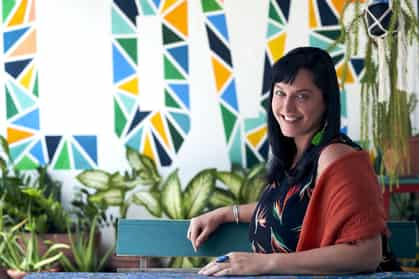
By the sounds of it Lisa has been on a mission her entire life. Turning vegan and animal rights activist at 12, she had to teach herself how to cook while juggling school, baby sitting and volunteering at a nursing home. “There was an influx of Bosnian refugees to St. Louis, Missouri when I was young and my uncle Matthew opened a free afterschool centre and food pantry, so by helping out I became interested in refugees and human rights at an early age,” said Lisa, whose sparkling green eyes shine with determination as she talks of her life’s passion. “I began working at 15, first in restaurants and then in bars, and worked any shifts I could all through my undergrad degree in media communications, focusing on documentary photography. I wanted to tell stories of war-torn refugees and share them with the world to raise awareness so, right after graduating from university, I went off to India by myself to document Tibetan refugees’ lives. But after the first trip and following conversations with the Tibetans, I realised that the best way to support them was to teach them English and do teacher training so that they could tell their own stories.”
After many trips to India during which she gained a degree in education as well as a diploma in human rights, Lisa contracted cholera and decided to stop over in Thailand on her way back to the USA to recover. “But after a few days in an air-conditioned hotel in Bangkok,” grinned Lisa, “I found myself on a ten hour bus ride to the Burmese border where I spent two weeks in an orphanage.”
The experience of seeing that refugee camp, the poor living conditions and severely lacking resources, convinced her that this is where her skills would be most needed next. She returned to the US determined to come back to Thailand and spent the year recovering from her illness, working to save money, putting her affairs in order, and offering her services by mail to any and all relevant NGOS in Thailand she could find on the internet.
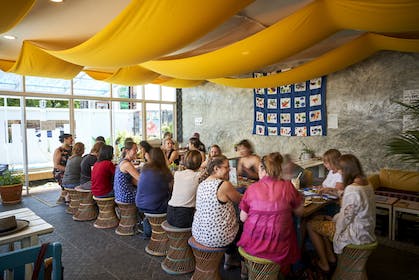
Upon her return, Lisa began volunteering in an orphanage in Mae Hong Son. “I was young, idealistic, energetic and it was like living a dream,” said Lisa of living in a shack with only half a roof, collecting water from the well daily, developing a teacher training programme and teaching English in the informal refugee camps and orphanage which included buying supplies for the school.
“Still, it took nine months for my money to run out,” she beamed with pride.
Cashless, Lisa made her way to Chiang Mai in 2004 to try to find a job so that she could continue her work with refugees, renting a wooden house in the old city for 1,500 baht per month.
“Just wandering around the neighbourhood, talking to Shan construction workers, Akha and Lahu flower girls, listening to their stories, developing relationships with the local community,” said Lisa, “I began to see how many tourists were behaving badly with these kids, drunkenly grabbing them and flinging them about in bars until early morning and much worse. I began to make fliers and would gather the kids and their mums together in front of Heaven Beach bar at 5pm to teach them art and English between their day shifts and nightly work. This was how I first got into the communities. I tried to enrol many kids in schools, but unlike now where the municipality schools accept non-citizen kids, they didn’t then and it was hard. So I thought that since I had a house, I may as well use it. I moved the evening classes to my home and soon students were looking through windows to see the white board hanging on the wall. I was teaching rich doctors’ children English to make money to teach poor kids, and often the rich kids would donate their toys!”
Lisa is constantly astounded at how little large NGOs and foundations achieve with their big budgets and offices. “Because of my connection in the communities, I simply sat on the floor and listened to people’s problems, then we would find a way to solve them. I got so much done in those first years. To me it was never about money, but about passion to make a difference and the ability to listen to real needs.”
Thai Freedom House was officially formed in 2005. “It was literally my house, with a little teepee I built in the garden for outdoor classes. I also cooked and fed them as I knew that they didn’t have time to eat otherwise. Today we still provide healthy snacks, herbal tea and juices to our evening students.”
Over the years, Lisa worked at an international school to fund her projects, built a library, began to seek out volunteers, started teaching Thai, Burmese and Shan, as well as English and art and other skills such as sewing and cooking, all the while moving locations multiple times as she expanded. The language and arts centre is really about a holistic community of support and healing for the people that they serve, Lisa explains, making sure that they are heard and that their needs are met.
“It was around that time that I met Steve Yarnold who was then running the Rooftop Charities Parties, the precursor of the current Citylife Garden Fair,” said Lisa. “He asked me to pitch my project which was essentially to create a social enterprise, but before the term was coined. I wanted to open a restaurant which would allow us to be self-sustainable. I didn’t want to rely on the whims of international donors, I had seen how terribly that worked out for so many in the past. I had to scrimp and save to buy the charity event tickets as well as a pair of shoes to go to the hotel presentation event.
Incredibly I won, and was given a 250,000 baht donation which allowed me to purchase what we needed to get the doors open to Free Bird Café. This experience also opened up a whole new world to me. I met wealthy retired people who wanted to help and fellow grassroots organisations who all supported each other.”
Lisa opened Free Bird Café in 2009 and it soon became a destination for health food lovers, vegans, vegetarians and back packers. While the cuisine was Shan, the menu also encompassed many more new aged dishes popular with the younger and more health-conscious travellers and expats. The café would close at 4pm and the students arrive at 5pm. Being pre-social media, it was a tough beginning as her concept was very novel and hard to translate. But slowly word got out and Lisa’s dedication to her principles began to pay off. She bucked social pressure and went full vegan, she used repurposed items for furnishing, she was the first business in Chiang Mai to ban the use of plastic straws…and eventually plastic altogether. “The restaurant gave our students a great sense of pride in seeing people from around the world eating and loving their cuisine. Then on top of that, to know that their food was funding their education.”
Fortuitously in late 2017 the Citylife Garden Fair raised 158,000 baht for Lisa’s projects which coincided with when she had to move out of her then-location. This sum funded the move to Lisa’s projects’ current home, where she hopes to remain for many years to come.
“Taking on such a huge space and overhead is very scary,” said Lisa in her little office on the second floor. “I have to overcome my fears of not making it. But I am more determined than ever to make this work, the needs of the community that we serve have not diminished and as long as there is a need, I will provide services. 100% of all profits from our various social enterprise projects goes to our learning centre, Thai Freedom House and Free Bird Café is now open at nights, and will soon host events, open mics, live music and more. The café also serves as a Hospitality Training Centre for adult refugee students, providing them with a living wage and on-the-job training. The Free Bird
Pre-Loved Charity Shop and Donation Centre sorts donated goods which we accept year-round and for the past decade about two to three truckloads are distributed to Burma and Northern Thailand weekly; 1% of which we keep to sell in our store, its income paying for the cost of distribution. Then we have My Best Life CNX, Chiang Mai’s first zero waste store, which is all about doing the best you can, for yourself, and the planet. It is full of cruelty free, plastic-free, chemical-free products that are affordable with all profits going to support scholarship funds for adult Thai Freedom House refugee students attending university.”
At this point she proudly introduces us to Nap Dow, a Shan girl who is currently on a full scholarship to Mae Fah Luang University, and who started her time at Thai Freedom House as a 12 year old girl, working full time selling fruit at a Thai school. Nap Dow is a now confident polyglot, speaking five languages and studying communications. She is spending her summer holiday helping out around the office.
Lisa still doesn’t take one baht from her enterprise, unbelievably she has yet another business, Lisa Byrd Collection where she sells crystals and provides energy healing services which cover her personal expenses.
Her ambitions for her social enterprise are great. Study abroad groups, PhD research student groups and more have been visiting for the past nine years for talks from Lisa about social enterprise, education, refugee rights and social work. Lisa now also provides sustainable workshops and trainings for aspiring social entrepreneurs. She is constantly putting on special activities, updating her menu and décor to reflect trends and customer demands. Her students have grown up, some have even met one another at Thai Freedom House, married and now send their children to her to learn.
Quivering with energy, Lisa moves seamlessly from our photoshoot (which had Nap Dow giggling at the incongruous sight of Lisa actually frocked up for a change) to rushing down stairs to climb a ladder to show a construction worker where to hang a light. Next thing I knew she was off in the kitchen, coming out smelling of a new margarita mix she was preparing to add to her cocktail menu, then rushing off to hug a regular who was carrying in a box of donated goods.
Seeing me fondling some yoni eggs, she explained what they were and offered to give me a reading as to which would be best suited to my needs. Startled, I decided at this point that I had to go home and decompress from the sheer level of energy and breadth of activity which surrounds Lisa.
“Yeah, I know,” she grins, her arresting green eyes shining. “My mum says that I have always lived a couple of lives simultaneously.”
Lisa has been working full throttle and on multiple fronts her whole life, and while she has much more she wishes to achieve, she admits that it would be nice to have some help. The aim is to continue serving the refugee and migrant population in Chiang Mai, teach the public about sustainability and expand the café’s menus and activities, so that she can spend more time on her creative pursuits; design, dye, upcycling.
“I get my energy from seeing the kids happy and safe, when I read an awesome review for Free Bird Café, when someone stops me and tells me I changed their Chiang Mai experience or that I helped them to live without plastic,” she beams. “These simple moments are where I get fuel to go on, that and my own meditation and spiritual practice of connecting with nature in my garden. I live in gratitude for the opportunity that I have to serve humanity, animals and the environment, though it is not lost on me that I receive just as much back in personal satisfaction.”
If you want to help simply go to the café and eat, shop, take some time to learn about how you can lessen your impact on the environment…and be sure to leave lots of comments on social media.
For more information visit www.thaifreedomhouse.org.
Tues-Sat 9am-9pm and Sun 9am-5pm (Closed on Mondays)
www.facebook.com/thaifreedomhouse/ IG: @thaifreedomhouse
www.facebook.com/freebirdcafe/ IG: @freebirdcafe
www.facebook.com/mybestlifecnx/ IG: @mybestlife_cnx
www.facebook.com/FreeBirdPreLovedCharityShopandDonationCenter/
www.facebook.com/BooBooBambooStraw/ IG: @booboobamboostraw
